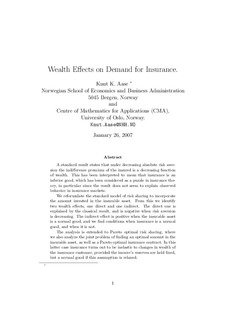Wealth Effects on Demand for Insurance
Working paper

Åpne
Permanent lenke
http://hdl.handle.net/11250/164111Utgivelsesdato
2007-01Metadata
Vis full innførselSamlinger
- Discussion papers (FOR) [566]
Sammendrag
A standard result states that under decreasing absolute risk aversion the indifference premium of the insured is a decreasing function of wealth. This has been interpreted to mean that insurance is an inferior good, which has been considered as a puzzle in insurance theory, in particular since the result does not seem to explain observed behavior in insurance markets.
We reformulate the standard model of risk sharing to incorporate the amount invested in the insurable asset. From this we identify two wealth effects, one direct and one indirect. The direct one is explained by the classical result, and is negative when risk aversion is decreasing. The indirect effect is positive when the insurable asset is a normal good, and we find conditions when insurance is a normal good, and when it is not.
The analysis is extended to Pareto optimal risk sharing, where we also analyze the joint problem of finding an optimal amount in the insurable asset, as well as a Pareto optimal insurance contract. In this latter case insurance turns out to be inelastic to changes in wealth of the insurance customer, provided the insurer’s reserves are held fixed, but a normal good if this assumption is relaxed.
Utgiver
Norwegian School of Economics and Business Administration. Department of Finance and Management ScienceSerie
Discussion paper2007:6